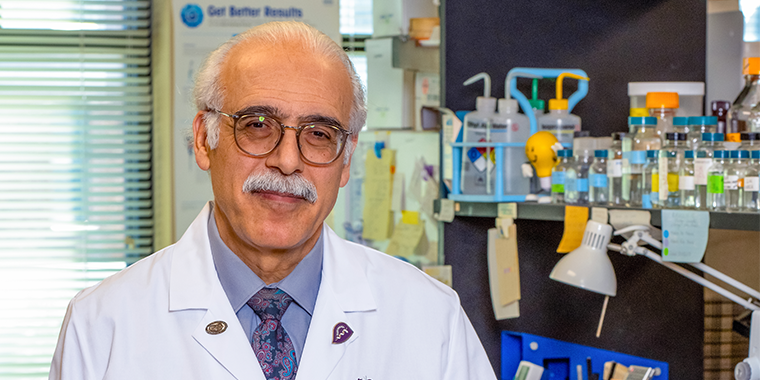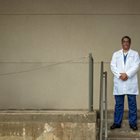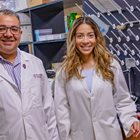Imagine a world where a simple blood test could give ALS patients a fighting chance, years before symptoms begin. At Kansas City University (KCU), Abdulbaki Agbas, PhD, MSc, professor of Biosciences, is working to make that vision a reality.
For more than a decade, Agbas has been on a mission to better understand neurodegenerative diseases like Amyotrophic Lateral Sclerosis (ALS), a progressive condition that robs individuals of the ability to move, speak and live independently.
Global collaboration targets earlier detection
For the past three years, Agbas has collaborated on a groundbreaking study funded by a $1 million grant from the Target ALS Foundation, which supports a global consortium in the United States, Switzerland and Italy. The team made a pivotal discovery: platelets—a readily accessible component of the blood—serve as a rich source of TDP-43, a protein closely linked with ALS.
“This was a breakthrough,” Agbas said. “It’s not just about detecting the protein. We’re studying its structure and posttranslational modifications. This molecular fingerprint could provide critical insights for earlier detection of ALS.”
To harness this potential, the team screened 12 monoclonal antibodies designed to detect TDP-43 in platelets, identifying the top three best suited for future clinical use. The antibodies were developed in partnership with AC Immune, a Swiss biotechnology company specializing in precision-targeting neurodegenerative biomarkers.
Tracking the disease in real time
Beyond his work with an international team, Agbas recently collaborated with a researcher from the University of Kansas Medical Center on a separate NIH-funded project that monitored changes in blood samples from ALS patients over time. This research offered valuable insight into how TDP-43 evolves and how its presence in the blood might be used to monitor the disease and possibly the effectiveness of emerging treatments.
Advancing research and education at KCU
Agbas’ research not only drives progress in ALS diagnostics but also opens valuable doors for students at KCU’s College of Osteopathic Medicine and College of Biosciences. By working directly with him in the lab, students play an active role in developing innovative diagnostic and prognostic tools. At the same time, they gain hands-on experience in advanced biomedical research, enhancing their skills and equipping them to contribute to future scientific breakthroughs.
As part of his broader investigation into neurodegenerative diseases, Agbas is also collaborating with the University of Kansas Alzheimer’s Disease Center to advance his biomarker research. This partnership will provide access to fresh blood samples, allowing for more robust functional biomarker analysis and bridging the gap between lab-based discoveries and clinical application.
He is also investigating how the brain’s waste-removal system may fail in neurodegenerative diseases, another key piece of the puzzle in understanding conditions like ALS and Alzheimer’s.
“If your kitchen garbage disposal breaks down, things pile up. Same with your brain,” Agbas said. “It’s not just about stopping the protein from clumping, we need to understand why the body can’t clear it out.”
Agbas and his consortium partners will present their latest findings at the Target ALS Annual Symposium in Boston, May 6–8, 2025. As the current grant from Target ALS concludes in September 2025, Agbas is actively seeking new funding to continue his research and broaden its clinical potential.
“In the race against ALS, time is everything,” Agbas said. “If our work leads to a way to catch it early, that could give patients precious time and that matters more than anything.”




(0) Comments